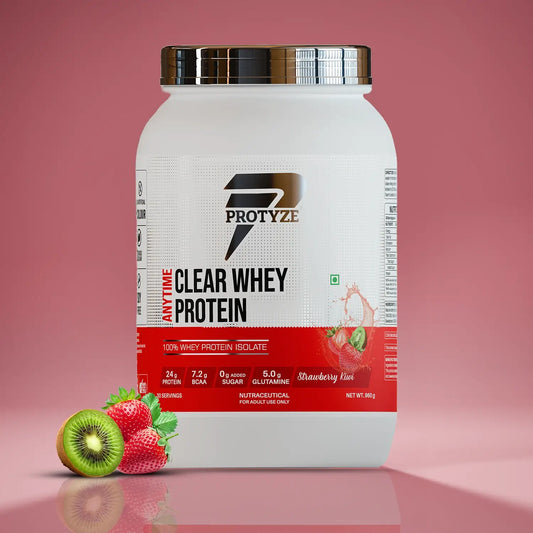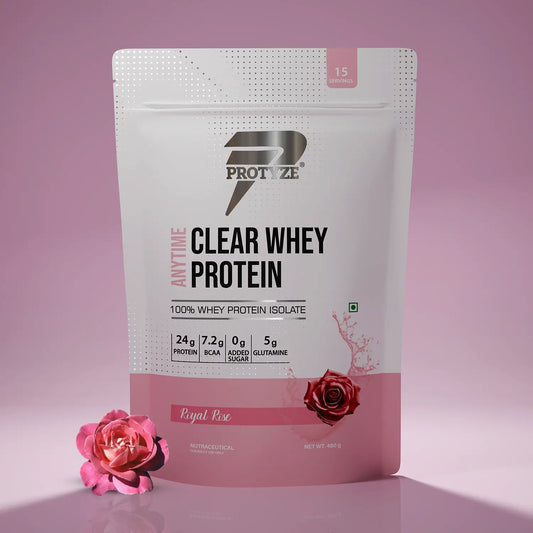Endurance athletes—whether runners, cyclists, swimmers, or triathletes—rely on stamina, muscle endurance, and efficient recovery to perform at their best. While carbohydrates are often seen as the primary fuel source, protein plays a critical role in muscle repair, recovery, and long-term performance.
But how much protein do endurance athletes need? Which protein supplements are the best for endurance training? And how can a high-quality whey protein supplement like Protyze support optimal performance? In this blog, we’ll break down everything you need to know about protein supplements for endurance athletes, their benefits, and how to integrate them into your training routine.
Why Do Endurance Athletes Need Protein?
Endurance exercise puts significant strain on muscles, leading to microtears and protein breakdown. Without adequate protein intake, muscle recovery slows down, leading to fatigue, soreness, and decreased performance.
Key Reasons Protein Is Essential for Endurance Athletes
- Muscle Repair & Recovery: Helps repair muscle damage after long training sessions.
- Prevents Muscle Breakdown: Preserves lean muscle mass, preventing excessive muscle loss.
- Supports Immune Function: Endurance training can suppress the immune system; protein helps maintain immunity.
- Aids in Energy Production: During prolonged exercise, protein can be used as an energy source when glycogen stores are depleted.
How Much Protein Do Endurance Athletes Need?
Unlike strength athletes who focus on muscle gain, endurance athletes require moderate protein intake to support muscle maintenance and recovery.
- General Recommendation: 1.2–1.6 grams of protein per kilogram of body weight per day
- High-Intensity Endurance Training: Up to 2.0 grams per kilogram for optimal recovery
- Post-Workout Intake: 20–30 grams of high-quality protein within 30–60 minutes after exercise
This protein intake can come from whole foods like eggs, lean meats, and dairy, but protein supplements offer a convenient and efficient way to meet daily needs.
Best Protein Supplements for Endurance Athletes
1. Whey Protein: Fast Absorption for Quick Recovery
Whey protein is the most popular protein supplement for endurance athletes due to its:
- Fast Digestion and Absorption: Quickly delivers amino acids to muscles after exercise.
- High Leucine Content: Stimulates muscle repair and prevents muscle breakdown.
- Complete Amino Acid Profile: Supports overall recovery and performance.
Protyze Clear Whey Protein is an ideal choice because it provides:
- High-quality whey protein isolate with minimal lactose
- Fast absorption for post-workout recovery
- No artificial fillers or added sugars
2. Casein Protein: Sustained Release for Overnight Recovery
Casein protein is a slow-digesting protein that helps:
- Reduce overnight muscle breakdown
- Support long-term muscle recovery
- Provide a steady amino acid supply throughout the night
Endurance athletes who train multiple times a day may benefit from taking casein before bed to aid in overnight recovery.
3. Plant-Based Proteins: A Dairy-Free Alternative
For endurance athletes who are lactose intolerant or prefer plant-based options, pea, rice, or hemp protein can be effective. A good plant-based protein should:
- Contain a blend of different plant proteins to ensure a complete amino acid profile
- Be easy to digest and free from unnecessary fillers
- Have adequate BCAA content to support muscle repair
4. Collagen Protein: Joint and Tendon Support
Endurance sports put stress on joints, tendons, and ligaments. Collagen protein:
- Supports joint health and injury prevention
- Helps maintain strong tendons and ligaments
- Aids in faster recovery from impact-based sports like running
While collagen doesn’t directly build muscle, it complements traditional protein sources to support overall endurance performance.
When Should Endurance Athletes Take Protein?
1. Pre-Workout (1–2 Hours Before Exercise)
- Provides a steady release of amino acids during long workouts.
- Helps reduce muscle breakdown during prolonged endurance activities.
- Best Sources: Whey protein with slow-digesting carbs (oatmeal, banana).
2. Post-Workout (Within 30–60 Minutes After Exercise)
- Crucial for muscle recovery and glycogen replenishment.
- Fast-digesting whey protein speeds up muscle repair.
- Best Sources: Protyze Clear Whey Protein mixed with water
3. Before Bed (For Overnight Recovery)
- Helps prevent muscle breakdown while sleeping.
- Casein protein is a great option for slow, sustained absorption.
Common Protein Mistakes Endurance Athletes Should Avoid
Not Eating Enough Protein
Endurance athletes often prioritize carbs over protein, leading to slower recovery and muscle loss.
Ignoring Protein Timing
Post-workout protein is essential for reducing muscle soreness and improving endurance performance.
Choosing Low-Quality Protein Supplements
Avoid cheap protein powders with artificial additives and fillers. Protyze Clear Whey Protein is a clean, high-quality option with fast-absorbing protein and no unnecessary ingredients.
Relying Only on Whole Foods
While whole foods are essential, protein supplements offer convenience and fast absorption, which is crucial for endurance recovery.
Conclusion
Protein is just as important for endurance athletes as it is for strength athletes. It plays a vital role in muscle recovery, injury prevention, and long-term endurance performance.
While whole foods should always be the foundation of your diet, protein supplements like Protyze Clear Whey Protein offer a convenient and effective way to meet daily protein needs. For the best results:
- Use whey protein post-workout for fast recovery.
- Consider casein protein before bed for overnight muscle repair.
- Include collagen protein to support joint and tendon health.
If you’re serious about endurance performance and recovery, Protyze Nitro clear Whey Protein is the perfect addition to your training plan. Fuel your endurance. Recover faster. Perform better.





